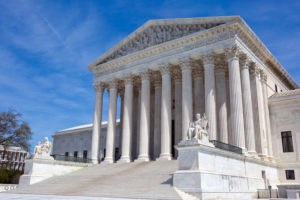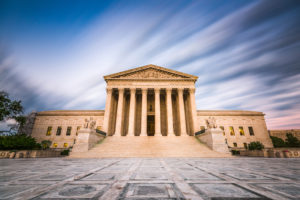
Supreme Court upholds travel ban, Justice Kennedy announces his retirement, and more…
IN THE NEWS
- In a 5-4 decision, the U.S. Supreme Court upheld the third version of President Donald Trump’s travel ban. Chief Justice John G. Roberts, writing for the majority, stated that on issues of national security the Court “cannot substitute our own assessment for the Executive’s predictive judgments” and “the Executive’s evaluation of the underlying facts is entitled to appropriate weight.” In dissent, Justice Sonia Sotomayor referenced President Trump’s anti-Muslim statements during his presidential campaign and opined that “given the overwhelming record evidence of anti-Muslim animus, it simply cannot be said that the Proclamation has a legitimate basis.”
- Justice Anthony M. Kennedy announced his retirement from the U.S. Supreme Court, effective July 31 of this year. In a statement released by the Court, Justice Samuel A. Alito, Jr. praised Kennedy’s tenure as “an impressive contribution to the development of the law in many fields” and Justice Ruth Bader Ginsburg said of Kennedy that “for the good he has done during the 43 years he has served as a member of the Federal Judiciary, he has earned a rousing Bravo.” Justice Kennedy’s opinions like Obergefell v. Hodges, Lawrence v. Texas, and Masterpiece Cakeshop Ltd. v. Colorado Civil Rights Commission, addressed states’ authority to regulate LGBT issues; his opinion in Citizens United v. Federal Election Commission dealt with the role of corporations in the context of federal campaign laws. Justice Kennedy was nominated to the U.S. Supreme Court by President Ronald Reagan and took his oath of office on February 18th, 1988.
- The U.S. Supreme Court ruled 5-4 that public-sector unions may not force non-members to pay a percentage of union dues because doing so violates non-members’ First Amendment rights. In the process, the Court overruled the 41-year-old Abood v. Detroit Board of Education precedent, which held that fair-share agreements—compelling non-members to pay into unions—were constitutional under the First Amendment so long as members’ dues were not used to fund political activity they did not agree with. Writing for the majority, Justice Samuel Alito called Abood “wrongly decided.” In dissent, Justice Elena Kagan argued that the majority’s decision constituted “judicial disruption” of a “deeply entrenched” decision unions rely on.
- In a 5-4 decision, the U.S. Supreme Court held that a California law requiring facilities that provide family planning or pregnancy-related services to notify women about state-funded abortion services likely violates the First Amendment. Writing for the majority, Justice Clarence Thomas declined to treat professional speech—statements made by someone in relation to his or her employment—as a distinct category of speech meriting reduced First Amendment protection. In dissent, Justice Stephen G. Breyer stated, “a Constitution that allows States to insist that medical providers tell women about the possibility of adoption should also allow States similarly to insist that medical providers tell women about the possibility of abortion.”
- The U.S. District Court for the Northern District of California dismissed suits filed by the cities of Oakland and San Francisco against five oil companies over the costs of rising sea levels allegedly accelerated by the companies’ contribution to climate change. In the order, Judge William Alsup wrote that both the court and the parties accepted “the science behind global warming,” but the solution to the problem is “best addressed” by the legislative and executive branches of government. A spokesperson for the San Francisco City Attorney’s Office reportedly expressed disappointment in the outcome but said that the ruling “doesn’t mean the case is over.”
- Oklahoma passed State Question 788, becoming the 31st state to legalize medical marijuana. Paul Armentano, Deputy Director of the National Organization for the Reform of Marijuana Laws, hailed the decision, noting that “public support for medical marijuana access is non-partisan.” Oklahoma Governor Mary Fallin (R), who opposed the measure, stated she would “respect the will of the voters” and examine “how best to proceed with adding a medical and proper regulatory framework to make sure marijuana use is truly for valid medical illnesses.”
- The U.S. Supreme Court ruled 5-4 that American Express’s (Amex) contracts prohibiting merchants from “steering” customers away from using their Amex cards does not violate Section 1 of the Sherman Antitrust Act. Although Amex does charge merchants higher swipe fees than its larger competitors Visa and Mastercard, Justice Clarence Thomas wrote for the majority, competition in the merchant and cardholder markets must be considered together as part of the same “two-sided” market, rather than separately; and that the government failed to show that Amex’s swipe fees exceeded the competitive price.
- The U.S. Supreme Court agreed to hear a case that could resolve a split among federal appellate courts about the evidentiary basis required to deny social security disability benefits due to “other work” available to the applicant. According to the petition filed, the U.S. Court of Appeals for the Seventh Circuit requires data to back up a vocational expert’s conclusions about an applicant’s available “other work,” but the U.S. Courts of Appeals for the Second, Sixth, and Ninth Circuits do not. The petitioners stated that “there is no justification for the current geographic discrepancy” and petitioned to ensure “the fair and uniform distribution of federal benefits.”
- The U.S. Environmental Protection Agency (EPA) published a notice announcing a review of the 2015 standard for ground-level ozone, the main ingredient in smog. EPA Administrator Scott Pruitt had challenged this standard in 2015 during his tenure as Attorney General of Oklahoma. Christy Leavitt of Environment America noted the trend of weakening air pollution standards and urged that legislators “accelerate our progress, not hit the brakes on effective programs like the federal clean car standards.”
- The U.S. House Transportation and Infrastructure Committee discussed the effects of the Federal Aviation Administration’s (FAA) regulatory reforms on commercial space transportation. Committee Chairman Bill Shuster (R-Pa) noted the high levels of growth in the field and called for “a clear regulatory structure to enable our national space industry and ensure public safety.” Caryn Schenewerk, senior counsel at SpaceX, expressed concern that the FAA rules could “limit innovation that could improve safety.”
WHAT WE’RE READING THIS WEEK
- In a working paper, Janne Rothmar Herrmann, professor at the University of Copenhagen Faculty of Law in Denmark, traced the development of Denmark’s regulatory framework covering assisted reproduction technologies. Herrmann argued that initial apprehension and ethical concerns surrounding in vitro fertilization in the 1980s sparked a legislative response leading to comprehensive rules concerning access to this technology. Herrmann posited that this initial response moved the regulation of fertility technologies “away from being an administrative regulation of the physicians’ professional activity to being a normative comprehensive Act with criminal law sanctions.”
- In a forthcoming article in the Cornell Journal of Law and Public Policy, Hila Shamir of Tel-Aviv University Faculty of Law, Tsilly Dagan of Bar Ilan University Faculty of Law, and Ayelet Carmeli proposed a policy framework for promoting gender equality that does not draw a strict “dichotomy” between government regulation and market solutions. Instead, the authors argued for a framework that helps with “creative thinking about more nuanced possible institutional options.” For instance, policy solutions may be characterized as universal versus selective, income dependent versus fixed sum, and in-kind services versus cash transfers. Where the solution comes from—the “regulatory state,” the family, or the market—is just one factor in the analytical framework that the authors proposed.
- In a draft article, Rebecca Bratspies of the City University of New York School of Law, wrote that, in an era where the federal government is refraining from regulating the environment, it is up to cities to determine the future of environmental law in America. Bratspies examined New York City’s efforts to deal with climate change and environmental justice and asserted that “New York City’s political leaders are rapidly positioning themselves to play a key role in driving national and global action to combat climate change and environmental racism.”



